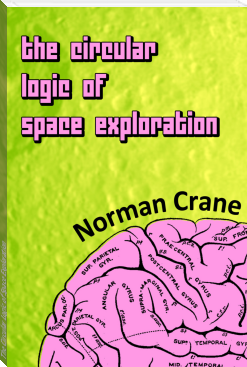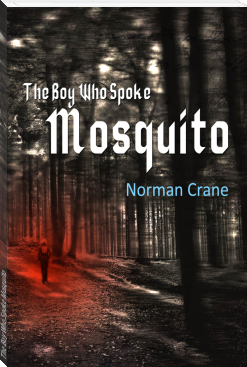The Circular Logic of Space Exploration - Norman Crane (best motivational books of all time TXT) 📗

- Author: Norman Crane
Book online «The Circular Logic of Space Exploration - Norman Crane (best motivational books of all time TXT) 📗». Author Norman Crane
Appleton rushed to scratch the message onto the back cover of a magazine lying face-down on a table near the telephone. Scratch—because the pen didn’t want to cooperate; the ballpoint stuck. Appleton’s fingers shook.
It was a prank, surely. The conversation had been recorded. He would end up on a website somewhere, the anonymous out-of-touch butt of some teenager’s joke.
Yet there was something in the quality of that voice, a voice that didn’t belong to any teenager, that forced the shapes of the letters through his wrist, onto the paper. Even as he felt the fool, he also felt the chronicler. The words could be historic.
The words: after a plain “hello” the voice had excused itself and muttered something about a wrong number and galactic interference. Then it had said, exactly, “No matter, you will have to do. My name is Charles R—and I am calling from Mars. First, record the date and time of this communication. Second, please bring it to the attention of one Mrs Mary Clare of 34 Wentworth St, Nottingham. Pass along also that I am doing fine and that, though food is scarce, I have had my fill, and that water is plenty once one digs past the red surface of things.”
That was all. Then the phone went dead. The connection had not been good to begin with, but there was no doubt about any of it. Nothing had been made up. There was no uncertainty.
Having written these five sentences, Appleton let go of the pen, wiped his forehead and retreated to the safety of his customary evening chair. It was a few minutes after six—his regular reading time—but Appleton gave no thought to books. Today, he sat silently in his chair until the clock struck seven. His neurons fired incessantly.
By eight, he had made up his mind: in the morning he would fly to Nottingham and personally deliver the message to Mary Clare.
There was only the slight problem of the wife.
She would arrive home tomorrow afternoon and find it empty. She would worry. Appleton’s greatest fear was that the wife would worry. She was of good breeding and delicate constitution, and worry might weaken her system enough to allow otherwise harmless bacteria to set up residence, which would lead to complications and eventually a prolonged bedridden death. He shuddered at the mere inkling. Right, he would have to compose a note: “My dear, I am off on a scholarly pursuit. Do not worry. I will return by Wednesday. Sincerely, your devoted husband.”
He folded the note and placed it on the dining room table. That, he realized, was more writing than he’d done since his tenure at Oxford. He felt productive again.
* * *
The plane skidded as it touched down, but the flight was otherwise without incident. Outside, grey clouds produced a cold mist that collected drops of water on the brim of Appleton’s hat as he waited by the terminal. Although no one could say so by looking at him, he was nervous.
He nearly misspoke while telling the driver the address. In the taxi, he caught himself rubbing his thumb compulsively against his forefinger like he hadn’t done since his rugby days.
* * *
The house at 34 Wentworth St was made of pale yellow brick. It was smaller and set farther from the road than neighbouring houses. A stone path led to the front door, on either side of which bloomed a well-kempt garden. Appleton walked the path slowly, cherishing the smell of wet flowers and realizing that over the last twelve hours he’d developed a particular mental image of Mary Clare. It was something like the opposite of the wife.
He stood for a few moments before the front door and deliberated whether to ring the electronic bell or use the bronze knocker. Eventually, he rapped his knuckles against the wood. A woman opened the door.
“Yes, hello,” said Appleton.
The woman looked suspiciously at his hands, but he wasn’t carrying anything except the back cover of the magazine on which he’d written the message from Mars.
“I’m not selling,” he said. “I’m looking for Mrs Mary Clare. I’ve been informed that she lives at this address. I have a message for her from Charles R—.”
“Did he send you, the scoundrel?”
Appleton blinked.
“Well did he or didn’t he, speak up. All these years and he can’t even come back to show his face, sends some other poor fool.” Her eyes studied Appleton’s hat. “Or maybe he’s dead. Maybe that’s what you come to tell me. Last of kin or some such.”
“No, Mrs Clare—“
“Simpson, but one and the same as you’re looking for.”
“Mrs Simpson.” Appleton fumbled the correction. He’d shoved one hand into a cloak pocket and was furiously rubbing his fingers together. “Yesterday evening I received a phone call. I wasn’t meant to receive it, you see, there was a mistake with the connection. The call was from Mr Charles R—. He asked that I deliver this message.”
Appleton read aloud what he’d written on the magazine cover.
The woman laughed and stomped her foot. She was in her sixties, Appleton realized. Sections of her hair were greying. The lines under her eyes were deep and permanent. Her laughter was not a joyous laughter.
She said, “Whatever trick it is you’re playing, and whoever you’re playing it with, I’m too old for it, you understand? The past is dead. Mr Charles R— is dead. And I deserve to be left to my own peace. Don’t come back here.”
But before she could close the door, Appleton put his hand on her shoulder. It was a soft shoulder. Appleton gasped. Never had he been so forward with a woman.
“Please, Mr Charles R— is not dead. I spoke to him. I heard his voice. I’m telling you the truth. He’s alive. He’s just on another planet. It’s utterly remarkable!”
Mrs Simpson looked at Appleton with suddenly sympathetic eyes and, even as she removed his hand from her shoulder, kept her voice calm:
“He’s dead to me.”
Appleton’s hand fell limply against the side of his cloak.
“There are certain things you do that, once you do them, their consequences are permanent. There is no pretending and there is no coming back. Take care now, Mister.”
With that, she shut the door.
* * *
Upon returning home, Appleton’s life returned to normal—at least in all superficial respects: he smiled to his wife, he kept to himself, and, at Six O’clock each evening, he retreated to his customary chair to read his customary books. The magazine cover on which he’d written the message from Charles R—, he placed in a private drawer in the desk in his study, underneath unfinished essays and research into particle acceleration and magnet engine propulsion and other old academic bric-a-brac.
For weeks, whilst trying unsuccessfully to locate more information about Charles R—, he kept the drawer unlocked. But, once he’d given up hope, he turned the key and, with one click, banished all thought of Mars from his mind.
Or at least that’s what Appleton intended. For there are certain neurons that, once they start firing, are impossible to stop. At most, they can be slowed—their work delayed. They are not obtrusive neurons: they do not prevent, say, smiling to one’s wife or reading customary books. But they are persistent and every so often they make the results of their operation known. This happens most-of-all at unexpected times, as, for instance, when Appleton, having bent to retrieve a particularly large pine cone from the grass, stood up with the complete schematic for the Magna-IV Engine before his eyes, or, upon having been asked by the local lady grocer for his opinion about a recent stretch of fair weather, replied, “My God, Ruthenium!”
Once such ideas made themselves known to Appleton, he began putting them to paper. Once they were on paper, he tasked other, more compliant, neurons with dividing and conquering any problems that the papers made apparent; and, once those had been solved, what else was there to do but gather the necessary materials and construct the first prototypes?
Appleton kept mum about this, of course. To his physicist colleagues, he was still at work on the same book he’d been working on for the last decade. He was still irrelevant. The wife, as long he smiled to her, suspected nothing. It was only his books that could have given him away—lying unopened on their shelves, their regular Six O’clock appointments long forgotten, their yellowing pages gathering dust—but books by themselves cannot speak. Appleton’s secret was safe.
Even as the project approached completion, not one soul suspected.
When launch-day finally dawned and Appleton, having composed a note to his wife indicating that he would be away until Wednesday on a scholarly pursuit, packed the pieces and prototypes into the back of a rented truck and drove to an old farmer’s field, from where he would blast off that very noon, the whole world was still naïve to the history that would soon be made.
In the field, Appleton worked diligently. He filled the shell of the rocket with each of the separate machines he had designed and constructed. He had a life support system, a navigation system, a communications system. He had propulsion. He had fuel. He had everything that was necessary. Nothing had been overlooked. As the sun rose, it rose on years of endless effort that, today, had physically and for the first time come together in the middle of such a previously insignificant English spot on Earth.
By Ten O’clock, the rocket was nearly complete. All that was left was the installation of the final ingenious detail: the captain’s seat: Appleton’s own customary evening chair.
That done, Appleton looked for one last time at the earthly sky, its thin clouds moving slightly across an orange sun, then climbed into the rocket and closed the hatch. The pneumatics sighed. The inside air was warm. As he set the navigation, every click and beep audible as if within his own skull, Appleton wondered what became of Mary Simpson. But just as it had come, the wonder passed. He confirmed his intended destination on the small liquid crystal display and took a deep breath.
The destination was unbelievable: Appleton felt feverish. He maneuvered into his chair and strapped himself in. Space was tight but he was not uncomfortable. Besides—he thrust a needle into a vein in his arm—he would be asleep for most of the journey. The sedative began to flow. He activated the countdown sequence. When he awoke, he would already be in Saturn’s orbit.
* * *
“Hello? Can you hear me?”
The communications equipment produced only a monotonous hiss punctuated by crackles. Appleton scratched his head. He’d programmed the system to link directly to the telephone in his home. The signal was strong enough. It should be working. He tried another connection.
This time, there was a faint click and the echo of a voice.
“Darling! It’s me. Please say something,” Appleton spoke into the receiver.
The voice wobbled.
“I hope you can hear me. I hope you haven’t been worrying. I hope I haven’t caused you harm. Please, darling, say something so that I know there isn’t a malfunction.”
The echoing voice suddenly came into rather clear focus. “Who is this? And do you want to speak with my mum?”
Appleton knew right away that it wasn’t the voice of the wife. In fact, it wasn’t even a female voice. It was the voice of a boy.
“My name is Appleton,” said Appleton. “I am attempting to contact the wife. Unfortunately, I may have miscalculated. Nonetheless, if you’d be a good lad and please make a note of the following: I am calling from Titan, which is the largest moon of the plane—
“Saturn, I know. I’m not stupid.”
Appleton cleared his throat and adjusted his headset. “Yes, that’s mighty good of you. As I was saying, I am on Titan, having only just





Comments (0)